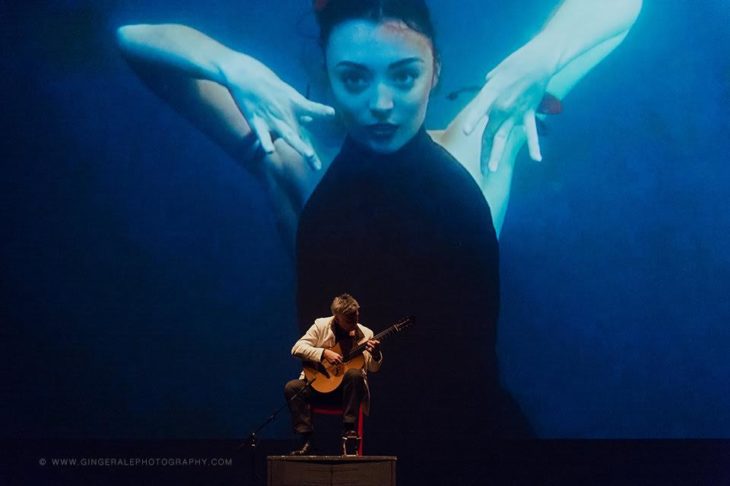One of the 20th Century’s most influential classical guitarists, Andrés Segovia, once said that the mark of a true performer is ‘a sacred fire… that love without which, a performer may be perfect but nothing else.’ South Africa’s own James Grace, as he clearly demonstrates through his concert performances as well as his four acclaimed CD releases, has that fire in abundance.
An Englishman by birth, he moved to Cape Town with his family when he was ten years old. He inherited a love for music in general and for the guitar in particular from his father. ‘My Dad played the guitar on an amateur level, so there was always a guitar lying around the house. I picked it up and just took to it,’ Grace recalls.
He began taking lessons with the late Dietrich Wagner, who taught guitar at Stellenbosch University. At the age of 15, he returned to England to complete his schooling. There he was taken under the wing of Carlos Bonell, first as a private pupil and later as a student at the Royal College of Music (RCM), where he enrolled as a Foundation Scholar after finishing high school. Bonell was a pupil of one of the most celebrated classical guitarists of recent times, John Williams, who himself studied under Segovia. Thus, Grace is carrying on a distinguished legacy of classical guitarists.
Upon graduating, Grace became the first guitarist in the history of the RCM to receive the Tagore Gold Medal, the College’s highest accolade. After a two-year teaching stint in Doha, Qatar, Grace returned home to Cape Town in 2003. Since his return, he has established himself as the country’s preeminent classical guitarist. His solo performances, his collaborations with other popular classical musicians – such as pianist Christopher Duigan and soprano Zanne Stapelberg – and his concerto recitals alongside the country’s top orchestras, have made him one of South Africa’s favourite concert performers.
His 2005 recording debut, Granada: Music of Spain, is a showcase of some of the best-known pieces in the Spanish repertoire: solo pieces by Granados, Sor, Albéniz and company. The guitar is so closely associated with Spain that many people overlook the works written for the instrument by composers from other countries, such as Italians Giuliani and Paganini and the 20th Century English composers Britten, Walton, Arnold and Tippett. While Grace occasionally performs these works, along with the transcriptions of various Baroque compositions that have long been popular features of guitar concert programmes, it is what he refers to as his ‘Spanish passion’ that forms the core of his work.
Portrait, his follow-up album, featured a more varied programme of concert works, including an ntermezzo written by his old mentor Dietrich Wagner. His third album, Café Latino is a rich and fascinating musical journey showcasing the unique developments that guitar music underwent in its migration from the Iberian peninsula to Latin America. For the guitarist, this SAMA Award nominated album provided an opportunity to bring the lesser-known South American works to his audience and to explore further the melodic, rhythmic and even percussive potential of the guitar. On his latest album, Sevilla, which was released earlier this year, he continues his exploration of Spanish music.
Looking ahead, he already has ideas for the third installment in the Music of Spain series. He also has ambitions to make a recording of Rodrigo’s Concierto de Aranjuez, which he has performed with every orchestra in the country, but has yet to commit to disc.
Listening to Grace’s recordings, one is struck by his remarkable mastery of both form and feel. His well-developed technique combines with an instinctive feel for the emotional requirements of each piece and expressive use of phrasing and rubato to create interpretations that are fresh and new, while at the same time remaining true to the intentions of the composers as written on the stave.
In 2007, Grace set up his own record label, Stringwise Records, which is now the exclusive producer of all of his recorded work. By setting up the label, he gave himself a gift that many artists long for but don’t often get: complete artistic control. He is personally involved in all aspects of production from repertoire selection to cover design to distribution, even going so far as to pack 1000-unit batches of CDs himself. For him, making music is his passion and every little part of the process is an expression of that passion. The end products of Grace’s meticulous approach to making his records are packages that are polished and attractive in both content and presentation.
Apart from performing, recording and running a record label, Grace also spends part of his week teaching at the University of Cape Town, where he is Head of Classical Guitar. ‘I’ve always enjoyed teaching. For me, watching students develop musically and being able to help them nurture their sound is one of the most rewarding experiences.’
Grace is currently in the process of setting up the Stringwise Young Artists Trust, which will help young musicians from around the country to produce their own records and provide them with bursaries for overseas study. Although he would be extremely happy if some of his own students became beneficiaries, the Trust is open to all music students, not just guitarists. And the final decisions are not up to Grace himself, but will be made by a board of trustees.
After only a few years as a professional in the South African music industry, Grace’s contribution has already been considerable. As a first class performer, an entrepreneur and mentor to aspiring artists, he is a prime example of what one can achieve with a singleminded pursuit of one’s passion. Let us hope that this ‘sacred fire’ continues to blaze for a long time to come. – James Grace – “A Sacred Fire”
Classic Feel Magazine, 2009
Written by : Bryn Hunter
Subscribe To My Newsletter
BE NOTIFIED ABOUT BOOK SIGNING TOUR DATES
Donec fringilla nunc eu turpis dignissim, at euismod sapien tincidunt.
